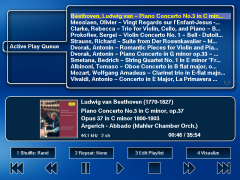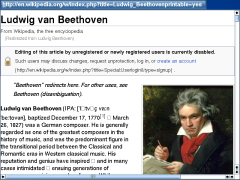 You can do great things with free content, and great things with free code, but combining the two multiplies their effect. So I found when I wanted to enhance my Free Software music system with more information about the compositions it played.
You can do great things with free content, and great things with free code, but combining the two multiplies their effect. So I found when I wanted to enhance my Free Software music system with more information about the compositions it played.
Wikipedia is by now among the canonical examples of what Yochai Benkler calls "peer production" of information. Working outside the traditional sphere of economic incentives, unpaid volunteers have built an encyclopedic database to rival Britannica, as a Nature study suggested. So I can learn a lot from Wikipedia, but I can learn about as much from Britannica if I have one, but where Wikipedia really shines is its access and the remix potential that comes from its generous license.
Popping up as the first result on a growing number of Google searches, Wikipedia brings knowledge closer than Britannica can. That one-click access also feeds a set of virtual network effects, if even a few of the people who read an entry from that search then go on to edit it or another article. The encyclopedia grows as its crowds seek more information.
Wikipedia's liberal terms of use further enhance its value, because I'm not limited to browsing it from my desktop web browser: I can select a subset of documents to load on a Treo or preinstall on the $100 laptop from OLPC. Finally, add free software to the equation and you open up the true generative possibilities, in Jonathan Zittrain's terms.
 So back to that music system. A friend, listening with me the other day as MythTV played music, asked whether the system could show more than the standard artist-album-track and album art on-screen. Not yet, but why not? MythTV is open source, Wikipedia is open information, and has surprising depth in classical composers. A few hours of coding later (and preliminary patches shared with the MythTV community), my music library now knows the dates of all its composers, and can bring up a composer's Wikipedia entry with a key-press while the music plays. Now, if I want to know who was writing music when the U.S. founders convened their Constitutional Convention, I need only ask MythTV (Mozart's Piano Concerto No. 26, for example).
So back to that music system. A friend, listening with me the other day as MythTV played music, asked whether the system could show more than the standard artist-album-track and album art on-screen. Not yet, but why not? MythTV is open source, Wikipedia is open information, and has surprising depth in classical composers. A few hours of coding later (and preliminary patches shared with the MythTV community), my music library now knows the dates of all its composers, and can bring up a composer's Wikipedia entry with a key-press while the music plays. Now, if I want to know who was writing music when the U.S. founders convened their Constitutional Convention, I need only ask MythTV (Mozart's Piano Concerto No. 26, for example).